Features | By Hamdi Khalif
Sustainable solutions: How alumni are pioneering ideas to safeguard the environment
In September 2019, the world witnessed millions of people take to the streets to demand a change to the climate crisis. Less than a year later, 20 per cent of Australia’s forests were engulfed by wildfire and East Africa continues to be overwhelmed by a swarm of locusts. These are not coincidences but symptoms of a deep-rooted problem with the environment.
This article follows three alumni who have placed sustainability at the heart of their efforts to make a difference.
Barefoot in Sudan
Dr Gada Kadoda (Information Systems and Technology, 1993) says, “even though I was at City for one year, the lessons I learned there stay with me for a lifetime”.
Since graduating from City, Gada has enjoyed a long and fulfilling career but her proudest moment was launching Barefoot in Sudan, a project that trains rural women in solar electrification and water harvesting. The concept behind the project is the brainchild of Bunker Roy, an engineer and social activist who founded Barefoot College to educate illiterate and semi-literate people from disadvantaged communities in India.
Gada first encountered Bunker Speaker while he was delivering the keynote speech at the third International Conference on Appropriate Technology in Kigali, Rwanda. When he showed a project map with dots across Africa, she began to dream of a similar quiet revolution in Sudan. She invited him for a visit and was pleasantly surprised when he came.
Even with three degrees, Gada believes much of education takes place outside the lecture theatre and the four walls of an institution. “I was drawn to Barefoot College’s praxis that formal education is not a prerequisite to becoming an engineer” she says. “Most of the women I worked with were grandmothers who never left their village and we were sent to India to be trained at the Barefoot College”.
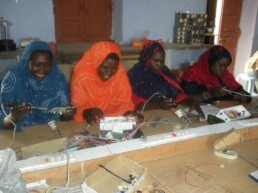
Gada piloted her project in Mirri in the Nuba Mountains of South Sudan but four months after the village had lighting and water harvesting systems, war broke between the Sudanese Army and the Sudan People’s Liberation Movement, displacing the communities she worked with. Even though the war had a devastating impact on the lives of women in the region, they sought to rebuild their futures and this in turn gave Gada hope. She says “the resilience of the women, to rebuild after every destruction, gave me the push to continue against the odds that dwarfed in comparison”.
Barefoot in Sudan trained twelve women from six villages. Gada hopes they will lead a local training centre which she plans to establish in the near future. The ethos is simple, ‘by the poor, for the poor’ with the aim of starting a chain reaction where one woman trains several others until every village in Sudan has electric power.
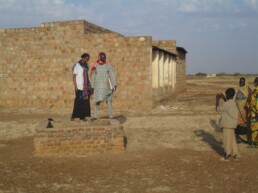
Gada’s story is one of technology justice and not monetary gain. “I have peace of mind knowing that I equipped poorer communities with the knowledge to improve their lives” she says. “As the grandmothers become community solar engineers, they introduce electricity to marginalised communities that are overlooked in national development planning”.
The Big Raise
Alexis Rowell (Food Policy, 2015) was a Sales Executive for several tech companies before choosing to leave behind a life of consumerism and embrace a lower impact existence. He is now the co-founder of The Big Raise(La Grande Raisandière), a permaculture farm in the Pays de la Loire region in France. The farm offers courses in permaculture, meditation and vegan cooking and aims to sell products grown on the farm in the near future (e.g., nut oils, chestnut flour and bottled fruits).
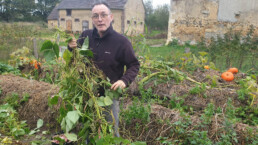
According to Alexis, “permaculture is a philosophy of life, not merely a system of sustainable agriculture. It is based on collaboration and ethics, and responds to needs rather than desires,” he adds, “unlike the world of capitalism he left behind”.
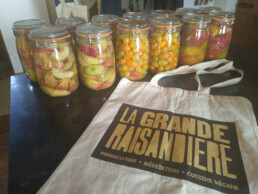
He describes permaculture as a toolbox that people can use to minimise their impact on the planet. He says “it is a dynamic system and not a static one. It is a combination of old traditions and new ideas. It is local action with a global vision. What makes permaculture sustainable is that it seeks solutions from nature while relying only on renewable resources”.
Permaculture mimics nature, something known as biomimicry, respecting the existing biodiversity of the land and consequently, yielding zero waste.
By Rotation
During her honeymoon in Rajasthan, India where she was born, Eshita (Management, 2014) was confronted with the issue of textile waste. She decided to do something about it immediately, testing out ideas on friends on the last days of her honeymoon. Following initial positive feedback, she created By Rotation, the first and fastest growing peer-to-peer fashion rental app in the UK.

Eshita likes to think of By Rotation as the AirBnb of designer fashion. She understands that loaning and renting clothes may seem strange at first but she quickly points out that it is no different from sleeping on a bed in an hotel room or using its towels in a bathroom.
As a rental fashion platform, By Rotation does not buy inventory but rather its members share their closet with others for a small fee. So, in essence, members are not only making money from what they already own, but they are also helping to reduce waste by not buying into consumerism. This is why By Rotation earned the Eco-Age brandmark, which and won the Drapers Sustainable Fashion Awards 2020, two of Eshita’s accolades. Other milestones include receiving recognition from Business of Fashion, Forbes and Vogue magazines.
“There is no way our planet can digest the 24 million items that are being bought at H&M alone every day” she says. “Business models and circular systems such as By Rotation are the future of consumption, while upcycling and new methods of production such as digital clothing will provide the creative and viable alternatives to new fashion”.
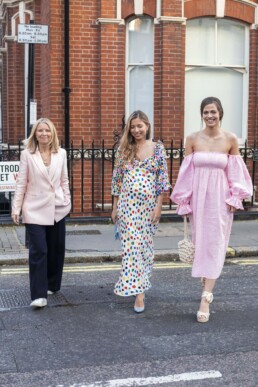
Today, By Rotation has over 25,000 users and continues to grow 300 per cent every quarter. It is no surprise that it has caught the eyes of celebrities such as Stacey Dooley, Anna Shaffer and Saoirse-Monica Jackson, who support the sustainable concept that underpins the brand.
By Rotation seeks to transform the fashion industry by disrupting the linear path of consumption. “We are setting out to convince everyone that we no longer need to buy fast fashion and can instead share quality clothing with each other” Eshita says.
Eshita hopes that more people will grow accustomed to sharing their clothes they way they do their homes, both of which will bring communities together, not to mention helping to reduce harmful impact on the environment.